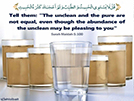Excessive drinking causes sterility
- Details
- Hits: 2305
Excessive drinking causes sterility
According to an American doctor Dr. Nelson, if a teetotaler can father eleven healthy children the alcoholic is at the most capable of having Three normal children. Moreover these children may be plagued with fainting, migraine, hot temper, lunacy, mental disability or anemia. Such children are the victims of various mental and physical problems.
The effects of liquor are also mirrored in the character of the drunkard. The alcoholic is usually a person of low character and has a foul tongue. Being in a state of intoxication most of the time, his behaviour is not normal or rational. Not being in control of his senses due to the influence of intoxicants, he has no hesitation in committing evil acts like murder, plunder, adultery, sodomy, exposing other peoples secrets etc. In fact he will unhesitatingly break every law, be it of land or religion.
The Islamic code of life requires that a person should use whatever power of reasoning Allah (S.w.T.) has granted him to conduct himself with deliberation and discretion. In fact Islam expects every individual to try and improve his reasoning power by increasing his knowledge with study and by associating with those more knowledgeable than himself. Even good actions, without thought and intent are of no avail.
Islam therefore prohibits all such actions that affect the reasoning capacity of man. The acts that top this list are alcoholism, gambling, deceit and lying. All of which deprive man of his capacity to reason. Carnal desires and falsehood are two things that are instrumental in the demotion of man from the high position of humanity to the lowliness of the beasts. Such a person is not capable of carrying any important responsibility. It is very difficult for an alcoholic to excel in any field. Even if he resolves to do something, his resolution is soon defeated. The more difficult, the more important a task is, the more difficult it would be for an alcoholic to accomplish it. Even if the wisdom behind every Islamic act had been unknown, it would have sufficed to accept it, as the same is advocated by intellect.
The Holy Qur’an has termed as ‘AthÄm’ (sins) such acts as murder, slander, and withholding testimony before a qualified Judge. Murder has not been termed as ‘Ithm al-kabir’ (the greatest sin) whereas sins like alcoholism and gambling have been specified as the ‘Ithm al-kabir’ (the greatest sin). The quote (“and in alcohol and gambling there is even some profit for men”) imply the profit which arises from the manufacture and sale of alcohol etc. But this profit is not even a pittance when compared to the losses that accrue with the consumption of alcohol. The loss of character, the loss of mental & physical health and over and above all this, the loss of Allah (S.w.T.)’s Mercy and blessing in the hereafter.
The Qur’an says in Surah al-MÄ’ida:
“O you who believe ! Surely intoxicants and games of chance and (sacrificing to) stones set up and (divining by) arrows are only an uncleanness, the Shaitan’s works, shun it therefore that you may be successful.”
(Surah al-MÄ’ida 5:90)
The prohibition regarding wine is of special significance in those two ayats for the following reasons:
1) The word ‘innama’ in the first ayat denotes emphasis.
2) Drinking of liquor is mentioned along with idolatry. Therefore drinking liquor is as serious a sin as idolatry.
3) Drinking of liquor has been classified as a satanic act along with gambling.
4) The verse emphatically orders one to avoid alcohol.
5) Avoidance of alcohol has been clearly shown to be a way of salvation.
6) The consequences of drinking liquor have also been listed namely; enmity, hatred and loss of belief in Allah (S.w.T.).
7) Then it is asked whether you would now avoid this evil or not.
8) After the prohibition, Allah (S.w.T.) orders to obey Him and obey the Holy Prophet (S). To beware of disobeying Allah (S.w.T.) and to know that the duty of the Holy Prophet (S) is to convey the message and complete the proof.
Tafsir al-Mizan quotes the dictionary meaning of wine as any liquid intoxicant. In the beginning the Arabs used to prepare it from grapes, barley and dates. But gradually new types of wines began to be produced. Nowadays there are many chemically manufactured alcoholic drinks. All these can produce varying degrees of intoxication. But however slight the intoxication a drink may produce, it is considered HarÄm. The word ‘rijs’ (indecency) implies everything that is evil.
The Qur’anic verses equate liquor with indecency. Human nature of its own accord is not inclined towards liquor. It is the insinuation of Shaitan that persuades man to consume such filth. Shaitan creates the illusion in the human mind that by consuming liquor one can obtain bliss and a feeling of exhilaration. The Qur’anic verses declare that it is the Shaitan’s plan to entice people towards wine, gambling and idol-worship so he can create enmity, hatred and avarice amongst them and succeed in diverting their thoughts away from Allah (S.w.T.) and their duty towards the Almighty. Due to loss of reason and self control they stoop to the lowest depths of inhuman behaviour.
Under the influence of an intoxicant every thing vile and vicious appeals to their fancy. They get pleasure in destroying other people’s wealth, honour and dignity ignoring all norms of civil behaviour. They may even speak insolently about their own religion and beliefs. They sink to the lowest depths of degradation when their own sisters and daughters appear to them as objects of gratification. When intoxicated a person will easily divulge the most confidential information in his possession.
The 33rd ayat of Surah al-Ar’Äf is as follows:
“Say, my Lord has only prohibited indecencies, those of them that are apparent as well as those that are concealed, and sin and rebellion without justice and that you associate with Allah that for which He has not sent down any authority, and that you say against Allah what do you not know.”
‘Fawahish’ (indecencies) is the plural of ‘fahsha’ (indecency). In Arabic it implies an extremely evil act. The other sins that are described by this word in Qur’an are adultery, sodomy and falsely associating someone with adultery and sodomy. ‘Ithm’ implies ‘sin’, and the Holy Qur’an clearly indicates that drinking and gambling are ‘Ithm’.
There is a tradition narrated by ‘Ali ibn YaqtÄ«n in the book al-KÄfi, wherein the Abbasid despot Mahdi asked Imam Musa al-Kadhim (a.s.) regarding wine, “Is wine HarÄm according to the Qur’an?” (Because) people know that it is prohibited but not aware that it is HarÄm.” Imam Musa al-Kadhim (a.s.) replied:
“Wine is HarÄm according to the Divine book.”
“At what place in the Qur’an is wine shown to be HarÄm?”
Imam Musa al-Kadhim (a.s.) said,
“In the following statement of Allah (S.w.T.),
‘Say, my Lord has only prohibited indecencies, those of them that are apparent as well as those that are concealed.’”
(Surah al-Ar’Äf 7:33)
Imam (a.s.) further said,
“As far as the apparent indecencies are concerned, they imply open adultery and ensigns that were hung outside the houses of prostitutes in the days of ignorance. ‘The concealed sin’ implies the sin of marrying the step mother after the death of the father as the people of the days of ignorance used to do. Allah has also ordered this act to be HarÄm. As far as sin is concerned, it is but “wine drinking”. At another point, Allah says,
“They ask you about intoxicants and games of chance. Say: in both of them there is a great sin and means of profit for men, and their sin is greater than their profits.”
(Surah al-Baqarah 2:219)
In the above tradition Imam (a.s.) first quotes the ayat where ‘sin’ is labelled as HarÄm. Then he mentions that verse where wine is ordained to be a ‘sin’. Hence when it is shown that ‘sin’ is HarÄm and wine is sin, then wine (and all alcoholic drinks) must necessarily be HarÄm.











